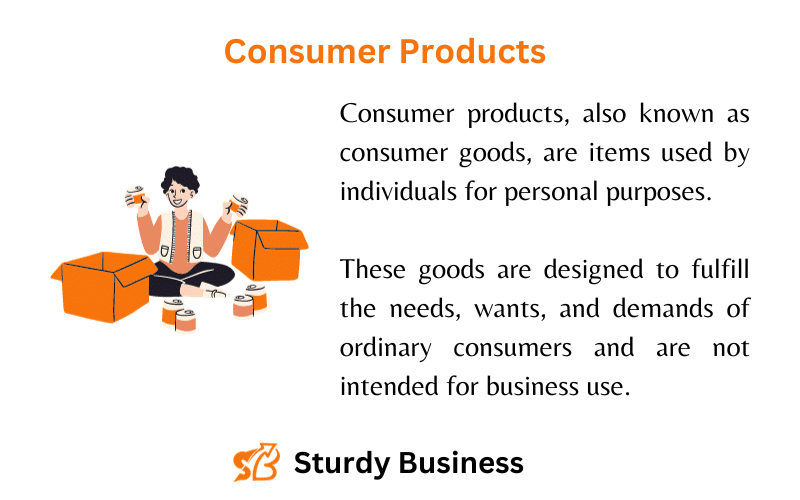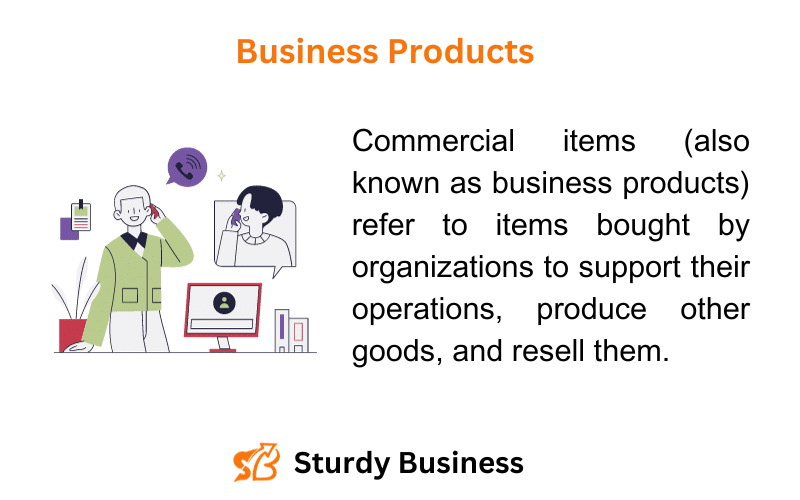There are two major categories of products which are consumer and commercial.
Have you ever thought about all the things you use daily, such as your mobile phone, that nice dress, or just your coffee machine? These are consumer products. They are created with the individual user in mind to make their lives easier and more enjoyable; thus, they are tailored to suit one’s needs (for example, cozy sweaters and smartphones).
Now suppose there are big machines, tools, and equipment that enable businesses to run smoothly. These are commercial products. They are meant for businesses and organizations rather than individuals. Think of it as machinery and tools that allow factories and offices to run smoothly without hitches.
Consumer products thus aim at improving individual lives, while commercial ones concentrate on helping organizations accomplish their work better. It is similar to saying your favorite gadgets in the house versus the huge machines that keep everything running in the enterprise world.
The understanding of the difference between consumer and business products by companies is very important. Why? How a company chooses to make purchases differs considerably from how you and I might select something in a store. Realizing this contrast helps firms make wise decisions and spend their money prudently.
To help you comprehend the concept of products more fully, we need to consider two major categories – commercial goods and consumer goods.
On this page
What are consumer products?

Consumer products, also known as consumer goods, are items used by individuals for personal purposes. These goods are designed to fulfill the needs, wants, and demands of ordinary consumers and are not intended for business use.
Consumer goods are classified in several ways depending on their perception and buying habits.
They can be classified into four types:
- Convenience products: These are the everyday items, like soap or snacks, that people buy without a second thought.
- Shopping products: These are items such as electronics or furniture that consumers compare and contrast before deciding to buy.
- Specialty products: These are unique or branded items, such as luxury cars or designer clothing, that are sought after because they have some features that distinguish them from others.
- Unsought products: Consumers do not usually think about it when choosing unsought goods. E.g. – insurance policies, prepaid funeral services, reference books, etc.
These products are either durable, lasting for long durations of time, or non-durable, meaning they get used up quickly, such as food.
What are commercial products?

Commercial or business products refer to items bought by organizations to support their operations, produce other goods, and resell them. In contradistinction with consumer products (those used for personal needs), business ones deal with their application.
There are several types of commercial products. Here are the primary ones:
- Installations: These are objects of greater size and are used directly in the production of goods, such as special equipment or machinery.
- Accessory equipment: This category refers to small tools and devices, such as computers or forklifts, that aid in manufacturing.
- Maintenance, repair, and operating supplies (MRO): These are items that businesses use every day to keep running, including office supplies or cleaning products. Most companies buy them in bulk.
- Component parts and processed Materials: These are parts that go into making final products; for example, car manufacturers will purchase batteries and windshields. Some materials may need additional processing before they can be used.
- Raw materials: These are things like oil or wood that companies buy to manufacture stuff out of. Usually purchased in large quantities, buying firms haggle prices and other conditions on delivery of merchandise.
Consumer products are what ordinary people purchase, while commercial products are what businesses buy to continue operating and make other things.
Quick contrast: key differences
Here are the major differences that set a clear distinction between consumer products and business products.
Intended Use:
- Business products: Intended for use in the industrial sector and meant to serve businesses. This includes machinery, equipment, and materials specifically crafted to enhance production processes, streamline operations, or contribute to the overall efficiency of businesses.
- Consumer products: Consumer products are tailored for individual customers, catering to personal needs and preferences. This category encompasses a wide range of items, from household goods and personal electronics to clothing and entertainment products.
Purchasing Decisions:
- Business products: Businesses base their purchasing decisions on detailed assessments of a product’s functionality, technical specifications, and compatibility with existing systems. Considerations may include the product’s lifespan, maintenance requirements, and its impact on overall operational efficiency.
- Consumer products: Consumer purchasing decisions are frequently guided by emotions, personal preferences, and social influences. Brands often leverage marketing strategies that appeal to the consumer’s emotions, aspirations, or desire for social recognition.
Product Characteristics:
- Business Products: Emphasis is placed on the technical specifications, functionality, and performance of the product. Businesses prioritize efficiency, durability, and compatibility with existing systems.
- Consumer Products: Design, aesthetics, and brand image play a significant role. Consumers are influenced by the perceived value, style, and features that align with their lifestyle.
Product Lifecycle:
- Business products: The lifecycle of business products may be longer, with a focus on ongoing maintenance, upgrades, and compatibility with evolving technologies.
- Consumer products: Consumer products may have shorter lifecycles, with frequent introductions of new models or versions to meet changing consumer preferences and technological advancements.
Now let’s discuss some of the key differences in detail.:
Target market:
Consumer products are the things that ordinary people buy for their own use. Think of your living room’s sofa or laptop for schoolwork. On the other hand, business products are what companies buy to perform better.
For instance, a hotel may purchase heavy duty commercial sofas for its lobby, whereas a company could acquire business laptops to be used by employees at work.
When selecting sofas and laptops, average consumers think about what they like or need most of the time. The reason someone goes for a colorful sofa is because it enhances his or her living room’s appearance. Also, one can make a choice of laptop considering that it is fast and has a large screen.
But businesses? They think about how useful something will be for their work. So, it might opt for durable sofas that can bear lots of guests who sit on them every day. While others may go with laptops that are reliable enough and suit their workers’ needs.
Purchase decision:
The decision-making process is also different between the two. Emotions, trends, or personal preferences can cause consumers to purchase a product. Well, imagine making your next dress selection based on style and how it makes you feel.
On the other hand, business decisions are mostly pragmatic. They consider factors such as cost-saving measures, efficiency issues, or the potential impact on their operation.
Cost and durability:
Cost and durability are another point of distinction. There is generally a wide variation in prices for consumer goods that have shorter lifespans. As an illustration, a popular toy of today’s trend may only last for a season before being overtaken by the next big thing.
However, business products are normally made to last longer because operational needs tend to be uniform over time. While they may have higher initial costs, they often provide better value in terms of their durability and reliability in the long run.
A lot of testing has been done on these products to ensure they meet strict quality standards as well as stand up for tough jobs. In industry, there is no time for errors so they must perform consistently.
Marketing Strategy:
Moreover, the consumer goods market is highly competitive because there is a high demand for them.
Branding and marketing play a major role in this area. Companies spend millions on advertising campaigns, branding strategies, and promotional activities to make their products different from others and connect with customers. Time spent on purchasing one product may lead to customer loyalty, which can translate into repeat sales on other items.
After-Sales Service and Support:
When it comes to things you buy for yourself (such as your phone or a blender), the focus is on keeping you happy even after purchasing them.
It entails having appropriate customer service that targets ordinary clients like yourself. Further, warranties and repairs are provided by these groups; therefore, in case there is any fault, they will correct it for you. They only want to make sure that whatever has been bought satisfies you.
However, when it comes to things used by organizations, such as large machines or computers, there is a different emphasis. This means they care for the smooth running of business. Thus, they deliver technical support and training designed specifically for business entities.
Another thing called Service Level Agreements (SLAs) also exists—a kind of contract setting forth the terms of ongoing support. It is the best way to ensure businesses receive just the right level of assistance so that everything works perfectly.